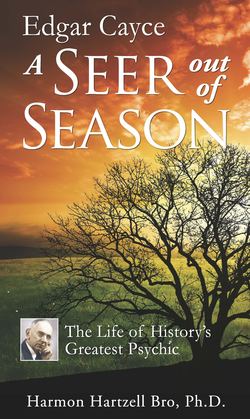Читать книгу Edgar Cayce A Seer Out of Season - Harmon Hartzell Bro - Страница 12
На сайте Литреса книга снята с продажи.
A Noiseless Flame of Goodness
ОглавлениеWhat were the stakes?
If the reports about Cayce were even partly true, his process might one day help to curb international warfare. Such a talent might undo the combative efforts of dictators, soldiers, and scientists alike, by inspecting and reporting on unseen technical developments and unknown military deployments, as well as unsuspected plans for aggression. Perhaps warfare among the nations, undercut by such relentless exposure, could one day become as extinct as gunfights on streets of the Old West. It was not clear from Cayce’s biography whether his talent could be directed to overcome coercive power. Through most of his life it had been used for rescue and nurture, chiefly medical and psychological. It might be so designed for growth of individuals who used it that only those who had removed violence from their hearts could call upon its aid in peacemaking—and then only for information that would jointly empower others to new life.
But even if Cayce could not be enlisted for military or political ends, surely he could help remove the causes of war. He was reported to have located oil with his strange gift, and guided inventors of useful chemical products and mechanical devices. Why should he not be enlisted to fight want, that old tormentor of the human spirit which ran ahead of wars? What might he suggest as new crops for farmers, or uncover as energy resources, or show as food in the sea, or propose as innovative products to manufacture? Would it be too daring to think that he might even have solutions to the riddle of distributing goods and services, so that the hatred and fear between the haves and have-nots, the developed and undeveloped peoples, might be tamed?
These were not mere speculations for me. Like many reared in Depression years who remembered Chicago’s breadlines, I was an activist and had been one all through high school, college, and graduate school. Peace, a just peace, was our passion. For years we had taken part in rallies, marches, and picket lines, as well as studied the issues and methods of political science. We could barely remember a world without Hitler, and burned with shame over American Nazi or Fascist brown shirts, black shirts, and silver shirts, as well as over noisy anti-Semites. Choosing my own undergraduate major with care, to make the required courses count as training for social reform, I had settled on labor economics, with my major professor the able Paul Douglas (later to become a distinguished U.S. Senator). At his encouragement I had taken a year of graduate courses in economics, with a career as a labor organizer a serious option, though I had finally chosen studies at the Divinity School, because they seemed to engage more deeply both human evil and human greatness. No one with this background, who had already published an article on poverty in the nearby steel town of Gary, could look at Cayce without asking what he might contribute to peace and social justice.
It did not occur to me yet that my approach to the entranced man in Virginia was shaped in part by the same ethic which had generated a civilization now torn open by a frightening world war: if you find a good thing, use it. Only confrontation with Cayce in action would prove, as it turned out, vivid enough to shift my perspective from simply using to more total responding: if you find something important, be open to transformation by it. Martin Buber’s penetrating distinction between I-it and I-thou relationships in every area of life had not yet hit me with the revealing force it later brought—though my Chicago classmate and friend, Maurice Friedman, was beginning a lifetime of setting forth Buber’s ideas.3
But on some of the June nights when I walked across the ample Midway to my post, gazing at the stars, I wondered whether we might be seeing in Cayce much more than better methods of social engineering. He might be part of a noiseless flame of unguessed goodness, shooting out from the center of war-tortured humanity to answer the thudding bombs, the goose-stepping troops, the wailing of swiftly orphaned children. Under the eternal night skies patiently bearing their witness to order, it seemed possible that the collapse of my world into hate and conquest, concentration camps and strident slogans, might awaken some awesome answering current deep within us all. Cayce might belong to the future, when procedures as dazzlingly simple as his might free a great campus such as ours to give full attention to hunger, illness, bigotry, illiteracy, and urban blight. With such aid, even the lowliest among us might help to create music, inventions, or imaginative schools.
